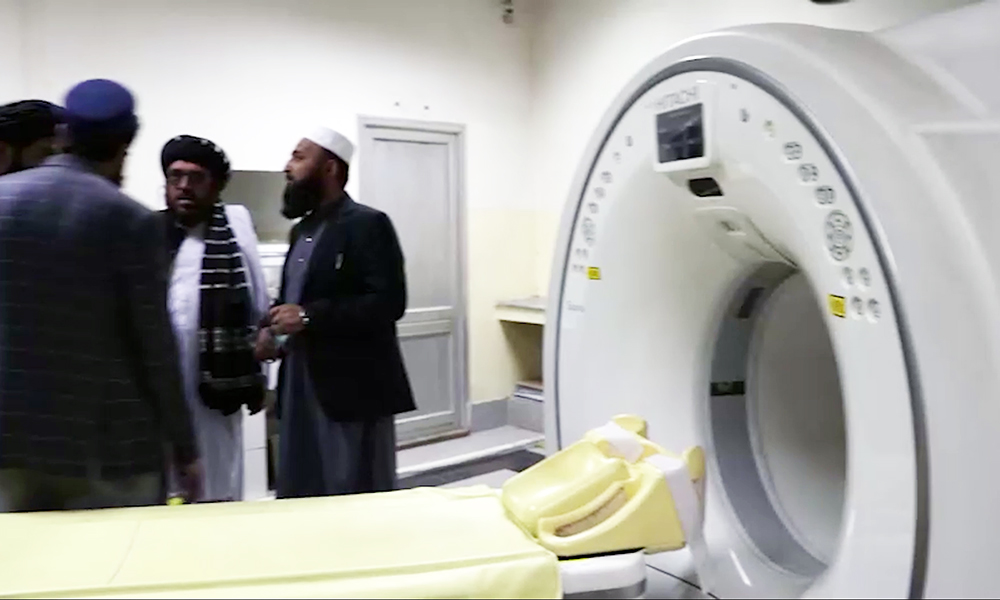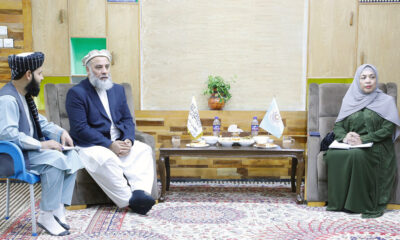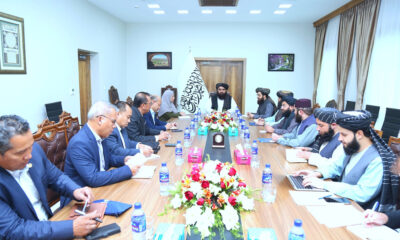Health
Bayat Group launches aggressive public health campaign – Coronavirus

The Bayat Group has launched an aggressive public health campaign – Stop The Virus (STV) – aimed to help Afghanistan to fight the novel Coronavirus.
The Bayat Group, one of Afghanistan’s largest private companies, and its two largest operating entities – Afghan Wireless Communications Company (AWCC), Ariana Television and Radio (ATN) – and Bayat Foundation have launched the nationwide public health initiative, which is disinfecting the cities and providing Afghans with essential information on how to protect themselves from contracting COVID-19.
 In a statement released on Tuesday, April 14, the Bayat Group said that it launched the campaign in March in partnership with the Afghan Ministry of Public Health.
In a statement released on Tuesday, April 14, the Bayat Group said that it launched the campaign in March in partnership with the Afghan Ministry of Public Health.
According to the statement the Bayat Group has also initiated public disinfection activities in many districts and public health facilities in Kabul and Kandahar in early April.
“COVID-19 is Afghanistan’s most serious health challenge in decades — and we’re determined to do everything possible to stop this virus from infecting more Afghans,” said Dr. Ehsan Bayat, the Founder and Chairman of The Bayat Group.
The organization has planned to expand the campaign throughout Afghanistan including in Herat, Nangahar, Balkh, Kandahar, and Kunduz Provinces.
“Working in partnership with The Afghan Ministry of Public Health, we’re expanding our Stop The Virus public health and education campaign throughout Afghanistan,” Dr. Bayat added.
“The Bayat Group and The Bayat Foundation will never relent in our long-term efforts to expand Afghanistan’s network of hospitals and medical clinics,” Dr. Bayat noted.
The Bayat Group’s leadership, and AWCC’s and ATN’s multi-faceted program to stop the spread of COVID-19, has been eagerly welcomed by H.E. Dawood Sultanzoy, the Mayor of Kabul City, together with many other public officials throughout Afghanistan.
Meanwhile, the Bayat Group and AWCC also distributed information about how to Stop The Virus to millions of Afghans, via the AWCC and ATN websites, Facebook, Twitter and SMS messages to AWCC’s 5,000,000 subscribers and ATN’s social media followers. This messaging — which was also made available in informational brochures as well as via regular television and radio Public Service Announcements (PSAs) — contained simple, easily-implemented recommendations for preventing the spread of COVID-19, including:
- Frequent hand washing, with soap and water
- Avoidance of close contact with others, by staying home as much as possible and keeping at least six feet apart from people (Social Distancing)
- Wearing masks or other face coverings when in the presence of others
- Covering coughs and sneezes
- Cleaning and disinfecting surfaces often
The STV is a powerful and compassionate example of The Bayat Group’s commitment to protect the health of Afghans.
“This is just another step in our journey to help give all Afghans to have access to healthcare that keeps them strong, healthy and able to build better lives.”
Dr. Ehsanollah Bayat underscored.
It comes as 70 new positive cases of COVID-19 have been registered in Afghanistan – Kabul 31, Herat 22, Kandahar 3, Ghazni 3, Maidan Wardak 2, Kunar 2, Nangarhar 2, Nimruz 2, Faryab1, Urozgan 1 and Baghlan 1 – bringing the total affected to 784 with 25 deaths and 40 recoveries, the Ministry of Public Health confirms.
Since 2006, The Bayat Group and The Bayat Foundation, Afghanistan’s largest charitable Foundation, have completed 500 projects to improve the health of Afghans, including the construction of fourteen hospitals that have provided life-saving medical treatment to 3,000,000 people.
Click here to download the press release!
Health
Azerbaijan urged to help improve capacity of Afghan health workers

Acting Minister of Public Health Qalandar Ebad, in a meeting with Azerbaijan’s ambassador, Ilham Mohammadov, called for the country’s assistance in improving the capacity of Afghanistan’s health workers.
The two sides also discussed cooperation in the health sector, capacity building of Afghan health workers, and Azerbaijan’s role in the health sector and other issues, according to a statement released by the Public Health Ministry.
Azerbaijan’s envoy said that his country seeks to cooperate with Afghanistan in a sustainable manner in the field of health.
In other news, the foundation stone for the construction of oxygen production facility was laid at the Indira Gandhi children hospital in Kabul.
Officials of the Ministry of Public Health said that the facility will be built with the financial and technical assistance of the World Health Organization, and with the capacity to produce 200 cylinders of oxygen daily to meet not only the needs of the hospital, but also other health facilities.
Health
Balkh health officials report sharp increase in number of cancer patients

Balkh Public Health Department officials say there has been a significant increase in the number of patients with cancer in the province.
“In 1401, about 2,613 OPD (out patient department) cases were registered with us. In 1402, these figures were 4,912 cases,” said Ehsanullah Kaliwal, the head of the oncology department at Balkh Regional Hospital.
Some doctors say genetic factors, environmental pollution, arbitrary use of medicines, and excessive consumption of meat were reasons for the sharp increase.
One doctor said cancer was also hereditry.
However, a large percentage of cancer patients in Balkh have stomach cancer. Many of them have appealed for the government to improve treatment facilities.
According to health officials, in the first month of this solar year (April), 423 cancer patients visited this hospital for treatment.
Health
Majority of Afghans with mental disorders are women: officials

Based on last year’s data, 52 percent of people with mental disorders in Afghanistan are women, the Ministry of Public Health said.
However, after the Islamic Emirate took over the country and with the improvement of nationwide security and the provision of better health services, mental disorders have decreased, the ministry said.
“Overall, the mental security of men and women in Afghanistan is not ensured and their mental security is disturbed. According to the figures shared with us, in 2023, 52 percent of the visitors for mental disorders were women,” said Sharaft Zaman Amarkhil, the spokesperson of the Ministry of Public Health.
“Generally speaking, we can say that compared to the past, the instances of mental illnesses have decreased,” he added.
People suffering mental disorders mostly refuse to share their problem, willingly or unwillingly.
“There are many problems at home; We are poor. I finished school, but didn’t find any job,” Ansar, a mentally ill person, said.
According to the World Health Organization (WHO), half of Afghanistan’s population suffers from mental distress.
Factors such as unemployment, poverty, domestic violence, ban on girls’ and women’s education and work, and drugs are said to be key contributors to mental distress.
-

 Latest News5 days ago
Latest News5 days agoRashid Khan named AWCC’s brand ambassador
-

 Sport5 days ago
Sport5 days agoJaiswal ton powers Rajasthan to big IPL win
-

 World4 days ago
World4 days agoNorth Korea officials visit Iran in a rare public trip
-

 Sport4 days ago
Sport4 days ago‘Serious talent’ Fraser-McGurk bonds with Warner to light up IPL
-

 Latest News5 days ago
Latest News5 days agoUS report cites ‘significant deterioration’ in Afghan women’s rights last year
-

 Latest News4 days ago
Latest News4 days agoOver 1,000 Afghan refugees forced out of Pakistan in one day
-

 Regional2 days ago
Regional2 days agoNew UK sanctions target Iranian drone industry
-

 Sport2 days ago
Sport2 days agoAfghanistan beat Iraq 5-3, inch closer to Futsal World Cup berth
































